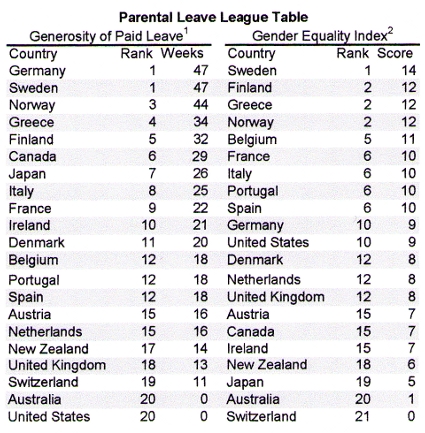•Press Release Europe Workers World
July 19, 2010
Finland, Norway, Sweden, and Greece Have High Levels of Both Generosity and Gender Equality in Parental Leave Policy Designs
For Immediate Release: July 19, 2010
Contact: Dan Beeton, 202-239-1460
WASHINGTON, D.C. – European countries, led by Finland, Norway, and Sweden, rank far ahead of the United States in guaranteed parental leave, according to a paper just published in the peer-reviewed social science Journal of European Social Policy. The new study examines the parental leave policies of 21 high-income countries and finds the U.S. to be the least generous. Sweden ranks highest for gender equality in parental leave practices, while, following a recent policy reform, Germany is the most generous in offering paid parental leave. Four countries show high levels of both generosity and gender equality: three Nordic countries (Finland, Norway, and Sweden), and Greece. 1
“The United States has the least generous parental leave policies of all 21 economies compared in this study,” said report co-author and CUNY Graduate Center professor Janet Gornick. “We pay a high price for our meager policy, because parental leave improves the health and well-being of children and their parents and paid leaves provide families with crucial economic support at such an important time.”

The paper, “Who Cares? Assessing Generosity and Gender Equality in Parental Leave Policy Designs in 21 Countries” by three researchers (Rebecca Ray, Janet Gornick, and John Schmitt) associated with the Center for Economic and Policy Research, examines parental leave policies according to three criteria: total time guaranteed for parental leave, whether paid or unpaid; total paid leave; and gender equality of the parental leave. While all 21 countries analyzed protect at least one parent’s job for a period of weeks, months, or years, there were great differences across these countries on each of the three criteria. France and Spain ranked highest in terms of total guaranteed leave (each with over 300 weeks), while Switzerland and the U.S. ranked at the bottom, with 24 and 14 weeks, respectively. The paper finds that the countries offering the most generous paid parental leave overall are Germany, Sweden, Norway, Greece, and Finland.
The paper includes a Gender Equality Index in order to underscore the fact that generosity and gender equality are different dimensions of parental leave policy designs. The index reflects both the portion of leave available for fathers and/or reserved exclusively for fathers and the percentage of earnings that are replaced during periods of leave. The countries that ranked highest on the Gender Equality Index were Sweden, Finland, Greece, Norway, and Belgium (with Germany ranking 10th).
Australia and Switzerland ranked near the bottom in terms of both generosity and gender equality of parental leave. Neither the U.S. nor Australia guarantee any paid parental leave, and were tied for the lowest ranking in terms of overall generosity of paid leave. The U.S. scored better on the Gender Equality Index, with a rank of 10, while Japan ranked near the bottom at 19th, contrasting with its 7th place ranking in terms of overall generosity (26 weeks of paid parental leave).
Table Notes:
1 The generosity of paid leave is measured as full-time equivalent leave: the duration of paid leave multiplied by the portion of usual wages that parents receive during that time. For example, Switzerland offers 14 weeks of leave, paid at 80% of usual wages, or the equivalent of 11.2 (rounded to 11) weeks of full-time leave.
2 The gender equality index is a scale from 0 to 15. It incorporates the following factors: the portion of a couple’s parental leave that is reserved for, or accessible to, fathers (accounting for 9 of the 15 points), the amount of fathers’ wages that is replaced during leave available to them (accounting for 5 of the 15 points), and other incentives for fathers to participate in parental leave (plus or minus 1 point).
The Center for Economic and Policy Research is an independent, nonpartisan think tank that was established to promote democratic debate on the most important economic and social issues that affect people’s lives. CEPR’s Advisory Board includes Nobel Laureate economists Robert Solow and Joseph Stiglitz; Janet Gornick, Professor at the CUNY Graduate Center and Director of the Luxembourg Income Study; Richard Freeman, Professor of Economics at Harvard University; and Eileen Appelbaum, Professor and Director of the Center for Women and Work at Rutgers University.
###